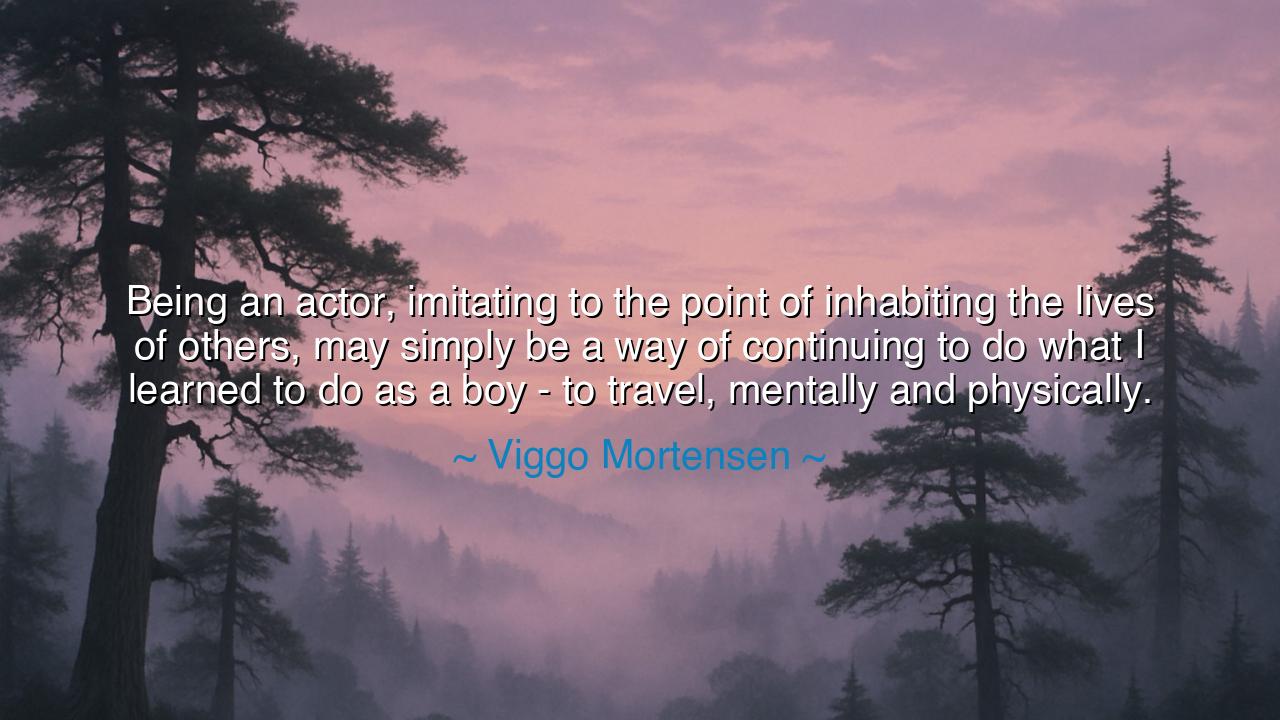
Being an actor, imitating to the point of inhabiting the lives
Being an actor, imitating to the point of inhabiting the lives of others, may simply be a way of continuing to do what I learned to do as a boy - to travel, mentally and physically.






Hear, O listener, the words of Viggo Mortensen, who spoke not as a mere performer, but as a pilgrim of the spirit: “Being an actor, imitating to the point of inhabiting the lives of others, may simply be a way of continuing to do what I learned to do as a boy—to travel, mentally and physically.” This saying reveals the sacred kinship between art and journey, between the road walked by the body and the road wandered by the mind. For in his confession lies an eternal truth: to act is to travel into the soul of another, and to travel is to act upon the great stage of the world.
The heart of this teaching is that acting is a form of travel. When the actor steps into another’s skin, he crosses unseen borders, venturing into the realm of another’s joys, sorrows, fears, and triumphs. Just as the traveler leaves his homeland to enter foreign lands, the actor departs his own self to dwell, however briefly, in the life of another. This is no shallow disguise; it is a true journey of transformation, a pilgrimage into the mysteries of human existence. Mortensen thus reminds us that the call of art is the same as the call of the road: to expand, to explore, to know what lies beyond the narrow boundaries of the self.
This wisdom was known to the ancients. The great Greek tragedians, when they donned their masks upon the stage of Athens, were not merely pretending—they were voyagers into archetypes, embodying gods, kings, and fates, allowing the audience to taste the struggles of others as if their own. So too did Odysseus, the eternal wanderer, become a master of disguise and storytelling. In his wanderings, he “acted” before strangers, kings, and enemies alike, surviving through the art of becoming what each moment required. His life itself was a drama, a living play upon the stage of the world.
Mortensen speaks also of his boyhood, when travel was both mental and physical. The child who wanders with imagination already begins the sacred practice of empathy. To picture oneself as another, to inhabit their joys and pains, is the earliest step in the great journey of compassion. Later, through acting, Mortensen continued this practice, refining it until it became both his art and his way of being. Thus, his words reveal that the seed of an actor is often planted in the soil of childhood imagination, watered by the desire to step beyond one’s own borders.
But let us not mistake this for mere play. To inhabit the lives of others is to take up a burden both noble and heavy. It demands humility, courage, and openness. The actor who enters another’s world must be willing to lose himself, to surrender his ego, to truly become for a moment what he is not. Likewise, the traveler who enters another land must shed his prejudices, his habits, his familiar comforts, and step humbly into the rhythms of the foreign. Both actor and traveler risk the same thing: the loss of the old self and the birth of a new one.
History gives us shining examples of this truth. Consider the life of Richard Burton, the explorer, who traveled into the heart of Arabia disguised as a pilgrim, speaking the tongue and walking the customs until he was no longer seen as foreign. He became, for a time, another man, another self, in order to journey where no outsider was allowed. His voyage was not unlike that of the actor’s craft, a living demonstration of Mortensen’s teaching: that to truly learn, to truly travel, one must become.
What lesson, then, lies within this quote? It is this: to grow is to travel into the lives of others, whether through art, imagination, or the road itself. We are not meant to remain confined within the narrow prison of our own experience. By inhabiting the lives of others—through listening, through learning, through embodying their stories—we gain a deeper vision of humanity, and we ourselves are transformed.
In practice, let each person cultivate this sacred art. When you read, do not merely observe—step into the mind of the character. When you meet a stranger, do not merely speak—imagine his struggles, his dreams, his hidden history. When you travel, do not pass through lands like a ghost—walk as though you were born of that soil, even for a moment. For the more lives we dare to live, the more fully we come to understand our own. And in this, Mortensen’s words resound as prophecy: to act, to travel, to imagine—these are not separate paths, but one road leading ever closer to wisdom.






AAdministratorAdministrator
Welcome, honored guests. Please leave a comment, we will respond soon